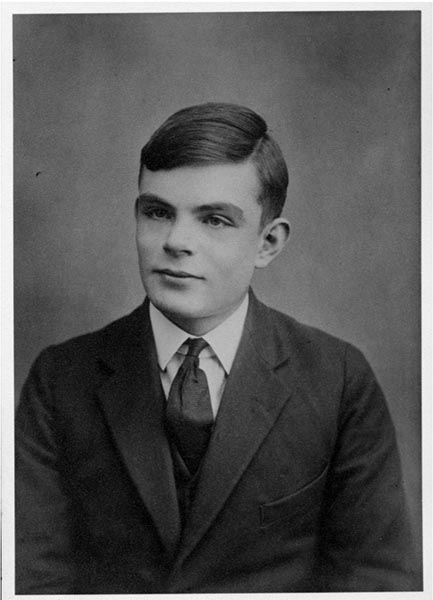
A proposed redesign of the original pride flag, centering the inclusion of marginalized communities within the queer community. Design by Daniel Quasar.
In support and solidarity with LGBTQIA+/Queer people around the world, we’re celebrating Pride Month with a collection of some of our most popular queer content from the blog. We take this moment to recognize the valuable contributions LGBTQIA+/Queer people make to our fields, our society, and our lives. Check out six of our favorites below!

Alan Turing, circa 1927. Public domain, courtesy of The Turing Digital Archive.
How influential was Alan Turing? The tangled invention of computing (and its historiography)
“These debates are really about the primacy of practices as opposed to ideas, to understand the efforts to build digital computers through the 1940s on their own terms, rather than as efforts to realize the Turing Machine. Theory was not necessary to build the first digital computers, although that theory proved very useful to building the discipline called “computer science.” Ideas followed practices, and not the other way around.”

A before and after shot after 2 years on testosterone therapy.
Learning to be Trans on YouTube (disponible en español)
“Noah’s desire to make his own videos reflects a lack of visibility of trans realities produced by and for trans people in the global south. Given the importance of these technologies to young, isolated trans people—many of whom first discover online that other trans people even exist—this is an important deficiency, and one that is increasingly being addressed by members of Chile’s trans community.”

Student activist faces obscured by emoticons. Photo used with permission from Rainbowfish.
Towards a Queer Art of Surveillance in South Korea
“Small-scale, yes, but surveillance need not always be connected to sprawling security apparatuses and institutions. So we ask again: when is a face not a face? When it is used to distinguish a body as a body rather than as an individuated person? With this post, we seek to explore possible answers to this question in the context of South Korea, by focusing on the role of self-surveillance in the politics of queer student activist organizations.”

Pot of powdered hormone for the crafting of subcutaneous hormonal implants. Salvador, Brazil
Emilia Sanabria on Bodily Plasticity in Brazil
“Emilia Sanabria’s ethnography of contraceptive practices explores how the boundary between nature and artifice is policed in Brazil, revealing the practical and political ways in which body’s capacities are molded, manifested or controlled, and to what ends.”

Picture of anti-LGBT protesters, police, and Queer Culture Festival Staff.
“There are moments of contact, of friction, and contraction, where we are confronted with the cyborg-like quality of watching and being watched. In our last blog post we explored the queer surveillance practices of young Korean activists and college students. Expanding upon the groundwork we laid there, in this post we ruminate on both the embodied experience of surveillance and overlapping and interactive manifestations of surveillance for queer activists in South Korea.”

An evangelical protesters holds a sign that reads: “More biology, less ideology. XX = Woman, XY = Woman” at a January 2018 anti-trans protest in Santiago, Chile
The Role of Scientific Discourse in Chile’s Trans Rights Movement (disponible en español)
“While Chile remains a majority Catholic country, Evangelicals have made significant inroads there and throughout Latin America, often bringing with them the political agendas of their US-based churches, including anti-LGBTQIA stances, opposition to abortion and birth control, and rejection of the scientific consensus on topics like climate change and evolution. Over the last year, however, during the most intense period of recent debate over the bill in the Chilean legislature, anti-trans activists have increasingly allied themselves with select members of the medical and scientific communities to plead their case.”
